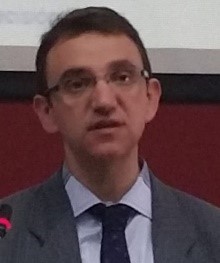Marek Reformat – Vilém Novák – Luis Martínez – The rest of keynote Speakers will be announced soon
Marek Reformat
Marek Reformat received his M.Sc. degree (with honors) from Technical University of Poznan, Poland, and Ph.D. from University of Manitoba, Canada. He is a Full Professor and Associate Chair of the Department of Electrical and Computer Engineering, University of Alberta.
His research activities focus on development of methods and techniques for intelligent data modeling and analysis leading to translation of data into knowledge. He uses the concepts of Computational Intelligence – with fuzzy computing and possibility theory in particular – as key elements necessary for capturing relationships between pieces of data and knowledge, and for introducing human aspects to data analysis and decision-making processes resulting in more human-aware and human-like systems.
He has published over 100 peer-reviewed publications in the areas of computational intelligence, knowledge and software engineering. He is an Associate Editor of a number of international journals. He is a past president of the North American Fuzzy Information Processing Society (NAFIPS), and a president of the International Fuzzy Systems Association (IFSA).
Title: Evidence Theory based Aggregation of Hierarchical Data in the presence of Uncertainty
Abstract: Complex systems are composed of multiple components that are arranged in a multi-level architecture, are of heterogenous nature, and can be geographically distributed. Methods suitable for determining states of individual components and the whole system are required. Such methods should manage variety of ways how states are described, as well as different sources and levels of uncertainty – uncertainty that can be linked with expressions representing components’ states, as well as with observations reflecting the current conditions of components.
In this presentation, we introduce and describe a novel approach to determine states – global and local – of complex multi-component systems of hierarchical architecture. We use elements of Evidence Theory and adopt a newly developed method suitable for determining levels of satisfaction of uncertain targets – expressions representing states of components – via ‘comparing’ them against the observations. In such a way, the most plausible conditions of the system and its components can be assessed. The process is performed in stages, where observable values are used at the lowest level of hierarchy, while the processing occurring on higher levels uses the results of computations performed at the lower levels. At the same time, degrees of belief in the assessed states of the system and its components are determined.
Vilém Novák
 Prof. Vilém Novák, Ph.D., DSc. is the director of the Institute for Research and Applications of Fuzzy Modeling of the University of Ostrava, Czech Republic. The institute (established in 1996) is one of the world-renowned scientific workplaces that significantly contributed to the theory and applications of fuzzy modeling.
Prof. Vilém Novák, Ph.D., DSc. is the director of the Institute for Research and Applications of Fuzzy Modeling of the University of Ostrava, Czech Republic. The institute (established in 1996) is one of the world-renowned scientific workplaces that significantly contributed to the theory and applications of fuzzy modeling.
V. Novák obtained a PhD in mathematical logic at Charles University, Prague in 1988; DSc. (Doctor of Sciences) in computer science in the Polish Academy of Sciences, Warsaw in 1995; full professor at Masaryk University, Brno in 2001. His research activities include mathematical fuzzy logic, approximate reasoning, mathematical modeling of linguistic semantics, fuzzy control, analysis and forecasting of time series, and various kinds of fuzzy modeling applications. He belongs among pioneers of the fuzzy set theory.
He was general chair of the VIIth IFSA’97 World Congress, Prague and of the international conferences EUSFLAT 2007, Ostrava and EUSFLAT 2019, Prague. He is a member of editorial boards of several scientific journals. He is often invited to give plenary talks at international conferences and to give university lectures all over the world.
He is the author or co-author of 5 scientific monographs, two edited monographs, and over 290 scientific papers with over 7000 citations. He was awarded in the International Conference FLINS 2010 in China and obtained the title “IFSA fellow” in 2017 for his scientific achievements. He is currently the vicepresident of IFSA.
Title: On fuzzy natural logic and its applications
Abstract: L. A. Zadeh, the founder of the fuzzy set theory, demonstrated in many of his papers that his approach makes it possible to develop a unique mathematical model of the semantics of some expressions of natural language and to apply it in solution of various practical problems. Recall one of the most successful applications | the fuzzy control in which control is realized by transforming operators (i.e., expert) knowledge formulated in natural language into an algorithm.
The fundamental role in these applications is played by expressions of natural language such as “small, very weak, medium, extremely large, significantly expensive” etc. Recall that they form a special class of linguistic expressions called evaluative linguistic expressions. In this talk, we will place them into a wider program of the so-called Fuzzy Natural Logic (FNL). Its goal is to develop a mathematical model of human reasoning whose typical feature is the use of natural language. Among results of FNL, besides the theory of evaluative expressions, belongs also sophisticated theory of intermediate (linguistic) quantifiers, or a special inference method called Perception-based Logic Deduction (PbLD), which provides the algorithm that behaves as if \understanding” linguistic expressions.
Besides the above theory, we also mention applications of FNL in control, multiple-criteria decision-making, forecasting, and mining information from time series.
Luis Martínez
Lu is Martínez received the M.Sc. and Ph.D. degrees in computer sciences from the University of Granada, Granada, Spain, in 1993 and1999, respectively. He is currently a Full Professor with the Computer Science Department, University of Jaén, Jaén, Spain.
is Martínez received the M.Sc. and Ph.D. degrees in computer sciences from the University of Granada, Granada, Spain, in 1993 and1999, respectively. He is currently a Full Professor with the Computer Science Department, University of Jaén, Jaén, Spain.
He is also Visiting Professor in University of Technology Sydney, University of Portsmouth (Isambard Kingdom Brunel Fellowship Scheme), and in the Wuhan University of Technology (Chutian Scholar), Guest Professor in the Southwest Jiaotong University and Honourable professor in Xihua University both in Chengdu (China).
He has co-edited eleven journal special issues on fuzzy preference modelling, soft computing, linguistic decision making and fuzzy sets theory and has been main researcher in 16 R&D projects, also has published more than 150 papers in journals indexed by the SCI and more than 200 contributions in Inter/national Conferences related to his areas. His current research interests include decision making, fuzzy logic-based systems, computing with words and recommender systems. He was a recipient of the IEEE Transactions on fuzzy systems Outstanding Paper Award 2008 and 2012 (bestowed in 2011 and 2015, respectively).
He is a Co-Editor-in-Chief of the International Journal of Computational Intelligence Systems and an Associate Editor of the journals, including the IEEE Transactions on Fuzzy Systems, Knowledge Based Systems, Information Fusion, the International Journal of Fuzzy Systems, and the Journal of Intelligent & Fuzzy Systems. He is a member of IEEE and of the European Society for Fuzzy Logic and Technology. Eventually, he has been appointed as Highly Cited Researcher 2017-2019 in Computer sciences.
Title: How to Manage Consensus Reaching Processes in Large Scale Group Decision Making
Abstract: Consensus reaching processes play an increasingly important role in the resolution of group decision making problems: a solution acceptable to all the experts participating in a problem is necessary in many real-life contexts. A large number of consensus approaches have been proposed to support groups in such processes, each one with its own characteristics, such as the methods utilized for the fusion of information regarding the preferences of experts. Given this variety of existing approaches in the literature to support consensus reaching processes, this talk considers two main objectives.
Firstly, it is revised and introduced a taxonomy that provides an overview and categorization of some existing consensus models for group decision making problems defined in a fuzzy context, taking into account the main features of each model.
Secondly, taking into account that classical models focus on solving group decision making problems where few decision makers participate, but nowadays, societal and technological trends that demand the management of larger scales of decision makers, such as e-democracy and social networks. Therefore, an analysis about performance of classical models in new scenario.
Eventually, new requirements to the solution of consensus-based group decision making problems, such as the below ones are discussed, analysed and fixed:
(i) Consensus metrics for analysing performance of consensus reaching processes
(ii) Comprehensive minimum cost consensus reaching processes
(iii) Increase the convergence of the consensus process keeping decision makers sovereign.
(iv) And monitoring tools to evaluate easily the evolution of the consensus process.
The rest of keynote Speakers will be announced soon.

